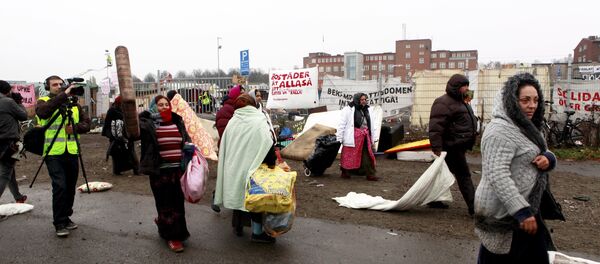"Together with the Germans, the French, the Austrians and the Swedes I have today sent a letter to the EU commission asking for the possibility to extend the border control for the next two years," said Inger Støjberg, Danish minister of immigration and integration.
"I have done so because we need to look out for Denmark. We have to protect ourselves against the Islamic State group, who are trying to take advantage of the situation where there are holes in borders. But also as protection against the influx of refugees coming through Europe," she said.
The Commission has admitted struggling to keep the Schengen zone open as more and more countries put up border controls and wire fences amid the migrant crisis, which was exacerbated when German Chancellor Angela Merkel declared Europe's doors open to refugees.
And the Schengen obsessives. If Schengen died tomorrow, vast majority of people would be unaffected. https://t.co/dggxxmBIbw
— Duncan Robinson (@duncanrobinson) April 29, 2016
Deep Flaws
The European refugee crisis has shaken Schengen to the ground. The original concept was to create a borderless Europe to help promoted the freedom of movement of people, goods and services — central to the core purpose of the European Union.
The economic consequence of dropping the Schengen zone, which allows for check-free movement of people throughout most of Europe, and reinstating border controls would have a substantially negative effect of its economy, costing US$120 billion.
According to research from think-tank France Strategie, restoring border controls, introducing passport checks at railway stations — which has already started to happen — will lead to a ten percent drop in trade, reduced car journeys and have a severely adverse effect on trade and tourism.
This is how much the end of Schengen could cost #Europe https://t.co/KTYW3sUlMl pic.twitter.com/JMtCwuRG8H
— World Economic Forum (@wef) April 28, 2016
Meanwhile, the European Commission is proposing fining EU member states that refuse to take in refugees at US$290,000 per refusal.
.@papadimoulis asked @EU_Commission on poor results of #refugees relocation program. Here is the situation so far. pic.twitter.com/QJ4iN2VUtb
— Dim Rapidis (@rapidis) May 3, 2016
The Commission has failed to reach agreement on relocation of refugees throughout member states. A scheme to relocate 160,000 in Greece and Italy has — so far — only relocated fewer than 1,000.



